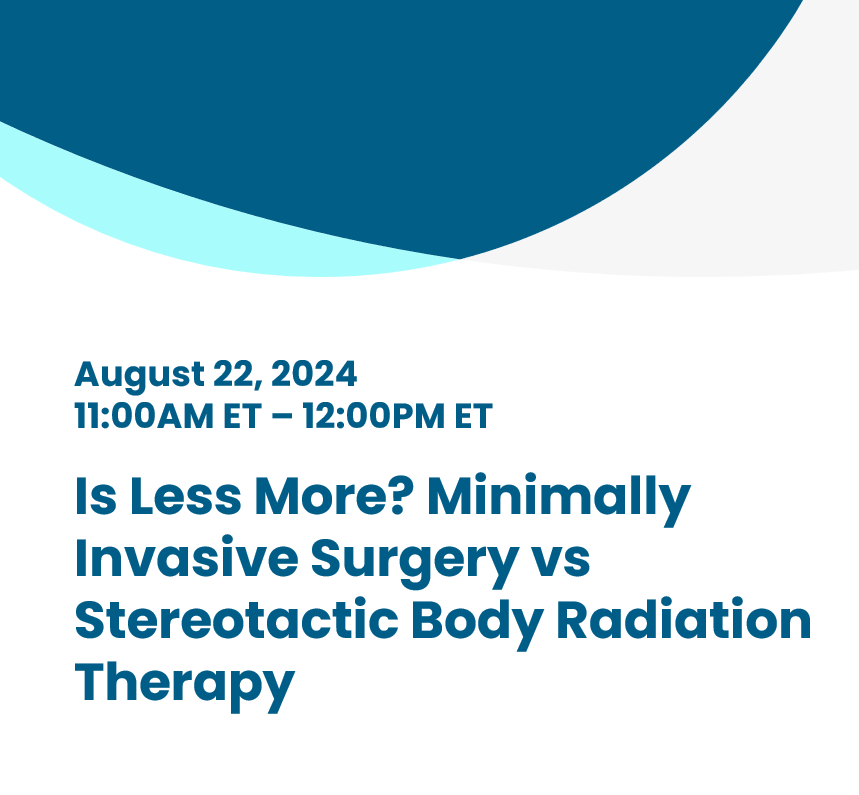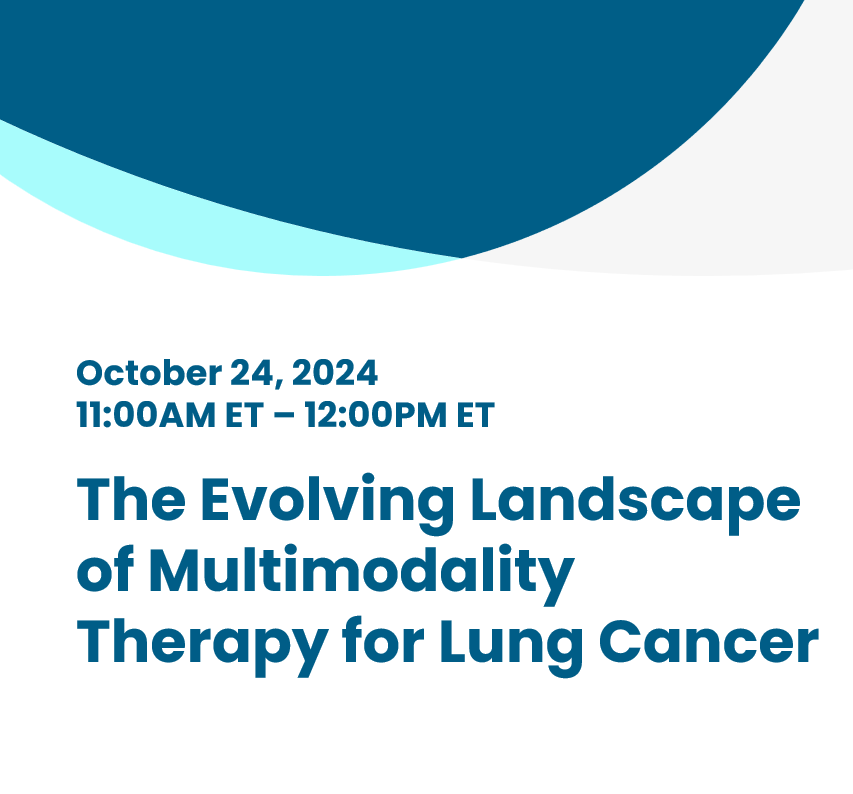Staging and Biomarkers
Improve guideline-concordant lung cancer staging and optimize the use of lung cancer biomarkers in practice

Triage for Appropriate Treatment Task Group
To increase access to, mitigate variability in, and improve outcomes associated with diagnosis, staging, biomarker testing, treatment, and surveillance among patients with lung cancer.

Is Less More? Minimally Invasive Surgery vs Stereotactic Body Radiation Therapy
Encore Webinar Series | August 22, 2024 Webinar

The Evolving Landscape of Multimodality Therapy for Lung Cancer
Encore Webinar Series | October 24, 2024 Webinar
Guideline-Concordant Research Articles
The NLCRT will reduce lung cancer mortality through the assurance of guideline-concordant lung cancer staging and optimal diagnosis through comprehensive biomarker testing to position patients for appropriate and timely therapy and care.
Outcomes After Surgical Management of Early-Stage Lung Cancer in Octogenarians: An in-depth Analysis of a Nationally Representative Cohort
Bostock IC, Fox AH, Ward RC, Engelhardt KE, Farjah F, Jeffrey Yang C-F, Smith RA, Gibney BC, Silvestri GA, for the American Cancer Society National Lung Cancer Roundtable (NLCRT). Outcomes after surgical management of early-stage lung cancer in octogenarians: an in-depth analysis of a nationally representative cohort. J Thorac Oncol. (2025).
The authors undertook this study to provide an updated assessment of age-related outcomes for patients who received surgical treatment for early-stage NSCLC. Utilizing the National Cancer Institute’s Surveillance, Epidemiology and End Results (SEER) database we characterized a variety of patient centered outcomes including 1-year mortality, 5-year survival, complication rates, and discharge status, in a cohort generalizable to an elderly US population.
Acquiring tissue for advanced lung cancer diagnosis and comprehensive biomarker testing: A National Lung Cancer Roundtable best-practice guide
Fox AH, Nishino M, Osarogiagbon RU, Rivera MP, Rosenthal LS, Smith RA, Farjah F, Sholl LM, Silvestri GA, Johnson BE. Acquiring tissue for advanced lung cancer diagnosis and comprehensive biomarker testing: a National Lung Cancer Roundtable best-practice guide. CA Cancer J Clin. 2023; 1- 18. doi:10.3322/caac.21774
In this best-practice guide, the authors begin by describing the broader context of non-small cell lung cancer disease, diagnosis, and treatment into which biomarker testing and directed therapies are being integrated. Biomarker-directed therapy has dramatically improved patient outcomes compared with conventional chemotherapy. Then the authors present, analyze, and discuss seven case scenarios to highlight the importance of securing adequate amounts of tumor for biomarker testing and to draw takeaway lessons and best practices from the analyses.
State legislative trends related to biomarker testing
Sadigh G, Goeckner HG, Kazerooni EA, Johnson BE, Smith RA, Adams DV, Carlos RC. State legislative trends related to biomarker testing. Cancer. 2022;128(15):2865-2870. doi:10.1002/cncr.34271
The authors outline the current state of biomarker testing for lung cancer treatment decisions, including the newer next-generation sequencing (NGS) panel methods. Financial barriers are described for insured and uninsured patients, despite overall cost savings with the incorporation of NGS screening for non-small cell lung cancer before beginning treatment. Insurance reimbursement for comprehensive biomarker testing was found inadequate when compared to established clinical guidelines. The authors also describe current legislation regarding insurance coverage for biomarker testing in three states (Illinois, Louisiana, and California) and recommend ways to improve and expand access to comprehensive biomarker testing by building upon current legislation.
Defining comprehensive biomarker-related testing and treatment practices for advanced non-small-cell lung cancer: Results of a survey of U.S. oncologists
Mileham KF, Schenkel C, Bruinooge SS, Freeman-Daily J, Roy UB, Moore A, Smith RA, Garrett-Mayer E, Rosenthal LS, Garon EB, Johnson BE, Osarogiagbon RU, Jalal S, Virani S, Redman MW, Silvestri GA. Defining comprehensive biomarker-related testing and treatment practices for advanced non-small-cell lung cancer: Results of a survey of U.S. oncologists. Cancer Medicine. 2022;11(2):530-538. doi:10.1002/cam4.4459
The authors sought to characterize lung cancer biomarker testing by both general and thoracic oncologists in cases of non-small cell lung cancer (NSCLC). They distributed a survey to 2374 American Society of Clinical Oncology members and analyzed 170 eligible responses. For NSCLC cases, 97% of respondents reported ordering tests for EGFR, ALK, ROS1, and BRAF biomarkers. Preferences were apparent for specific tests among academic clinicians and thoracic oncologists versus general oncologists. Providers also reported testing for actionable biomarkers before starting therapy. Treatment decisions were influenced by test turnaround time, level of specialization, practice setting, and experience.
Pretreatment Invasive Nodal Staging in Lung Cancer
Henderson LM, Farjah F, Detterbeck F, Smith RA, Silvestri GA, Rivera MP. Pretreatment Invasive Nodal Staging in Lung Cancer: Knowledge, Attitudes, and Beliefs Among Academic and Community Physicians. Chest. 2022;161(3):826-832. doi:10.1016/j.chest.2021.11.010
The authors used a web-based survey to characterize viewpoints on invasive nodal staging among thoracic surgeons and pulmonologists to determine why the practice is underutilized. Of the 453 respondents, 29% were unaware that pretreatment invasive nodal staging guidelines exist. Of the remaining 71% of respondents, 50% reported there was a lack of evidence linking staging guidelines with better patient outcomes, and 90% reported at least one barrier to guideline adherence, including delays in treatment due to the need for further testing. The authors agreed that multilevel interventions are necessary to increase knowledge of and adherence to invasive nodal staging guidelines before treatment for non-small cell lung cancer.
Knowledge and Practice Patterns Among Pulmonologists for Molecular Biomarker Testing in Advanced Non-small Cell Lung Cancer
Fox AH, Jett JR, Roy UB, Johnson BE, King JC, Martin N, Osarogiagbon RU, Rivera MP, Rosenthal LS, Smith RA, Silvestri GA. Knowledge and Practice Patterns Among Pulmonologists for Molecular Biomarker Testing in Advanced Non-small Cell Lung Cancer. Chest. 2021;160(6):2293-2303. doi:10.1016/j.chest.2021.06.027
The authors surveyed more than 7,000 pulmonologists to determine their roles in biomarker testing for non-small cell lung cancer (NSCLC). Of the 453 respondents, academic pulmonologists were more likely than community pulmonologists to perform or refer for an endobronchial ultrasound with transbronchial needle aspiration (EBUS-TBNA) for biomarker testing. In addition, interventional training, academic settings, and higher caseloads for diagnosing NSCLC were associated with more accurate knowledge of biomarker testing guidelines. Interventional training appeared to be more closely correlated than practice setting with the drive for improved knowledge and practice for biomarker testing.
Updates Regarding Biomarker Testing for Non–Small Cell Lung Cancer: Considerations from the National Lung Cancer Roundtable
Kim ES, Roy UB, Ersek JL, King J, Smith RA, Martin N, Martins R, Moore A, Silvestri GA, Jett J. Updates Regarding Biomarker Testing for Non-Small Cell Lung Cancer: Considerations from the National Lung Cancer Roundtable. J Thorac Oncol. 2019;14(3):338-342. doi:10.1016/j.jtho.2019.01.002
In this retrospective study, the authors describe the current state of biomarker testing for the treatment of non-small cell lung cancer. The barriers to screening are described, including perceived delays in treatment due to testing and turnaround time, lack of provider knowledge about reported and actionable biomarkers, and the need for molecular tumor boards at academic and community health systems. The authors describe several considerations for increasing provider education on current best practices, the importance of obtaining sufficient tissue samples, and the necessity for patient awareness and understanding of the benefits of biomarker testing.
The Role of Lung
Advocacy Organizations
in Biomarker Testing
Aldigé C, Roy UB, Boerckel W, Ciupek A, Donaldson D, Grossman H, Langhorne C, Rosenthal LS, Saxton C, Silvestri GA, Smith RA, Wenger L. The Role of Lung Advocacy Organizations in Biomarker Testing (White Paper). New York, NY. CancerCare; 2018.
The whitepaper outlines the advances in lung cancer treatment because of new targeted therapies based on biomarkers, the underutilization of biomarker testing, and suggestions for developing a plan to increase the uptake of biomarker testing by educating both providers and patients. The paper describes some successful lung cancer advocacy biomarker testing and awareness programs. Overall, a multi-factor approach is required to ensure that every advanced-stage lung cancer patient has biomarker testing completed at the time of diagnosis to guide appropriate and timely treatment decisions.